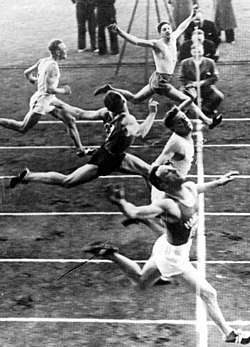You can help expand this article with text translated from the corresponding article in Finnish. (March 2023)Click [show] for important translation instructions.
|

Abraham Tokazier (born 29 September 1909 in Helsinki, died 7 April 1976 in Stockholm [1] ) was a Finnish sprinter of Jewish descent. His best achievement was second place in the 100 metres run at the 1938 Finnish Championships. He is best remembered for winning the 100 metres at the Helsinki Olympic Stadium's opening games, but being demoted to fourth place by the jury. Tokazier's club was Makkabi Helsinki.